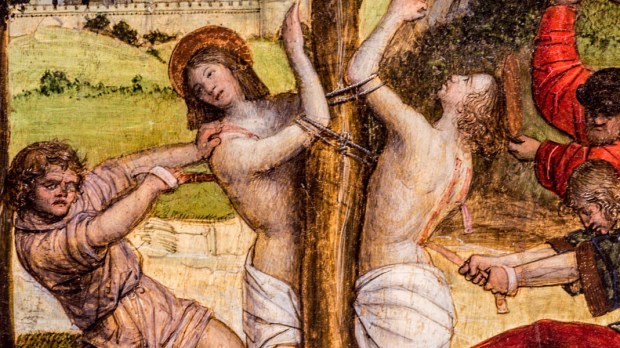One of the best known passages in Shakespeare’s Henry V is an epic speech of bravery, sacrifice and brotherhood. In the play King Henry rouses his soldiers’ spirits with a profound speech before the Battle of Agincourt on October 25, 1415.
The speech makes several references to “St. Crispin’s Day,” the traditional feast of Sts. Crispin and Crispinian. What’s interesting are the underlying connections between the speech and the actual saints honored on St. Crispin’s Day.
The feast day of October 25 honors the martyrdom of two men who were persecuted for the Christian faith during the reign of Roman Emperor Maximian Herculeus in 286. They were shoemakers by night and preachers of the Gospel during the day. The local governor discovered their activities and quickly ordered their execution. After trying to drown them, the governor sent both to the emperor, who had them beheaded.
Typically the Church celebrates the feast day of a martyr on the day of their death, recognizing the heroic sacrifice that won for them a victorious crown in heaven. In his speech, King Henry encourages the soldiers to associate the feast day of St. Crispin with the scars and wounds they will suffer during the ensuing battle, signs of the sacrifices they will make and the victory that will be won on the battlefield. Looking back as old men, Henry tells his soldiers, those who survive will throw a banquet for their neighbors on the eve of the feast,
And say “To-morrow is Saint Crispian.”
Then will he strip his sleeve and show his scars,
And say “These wounds I had on Crispin’s day.”
A further connection between the saints and the speech occurs later on. King Henry rallies his soldiers’ to stand together as a “band of brothers” (a phrase that inspired the popular book and mini-series of the same name).
And Crispin Crispian shall ne’er go by,
From this day to the ending of the world,
But we in it shall be rememberèd,
We few, we happy few, we band of brothers;
For he to-day that sheds his blood with me
Shall be my brother …
According to a popular tradition Sts. Crispin and Crispinian were twin brothers who were martyred together. Some scholars dispute the claim, but even if that tradition is unfounded, the two men could join in the words of King Henry and say to each other, “For he to-day that sheds his blood with me shall be my brother.”
Sts. Crispin and Crispinian were the first “band of brothers,” who fought bravely on the battlefield of the soul, conquering their inclinations and standing fast in the face of persecution. They are great models for us and hopefully someday we will be able to show them our own battle scars, representing the many sacrifices we made on earth to receive the victorious crown of eternal life.

Read more:
Shakespeare at 400: How he continues to shape Western culture

